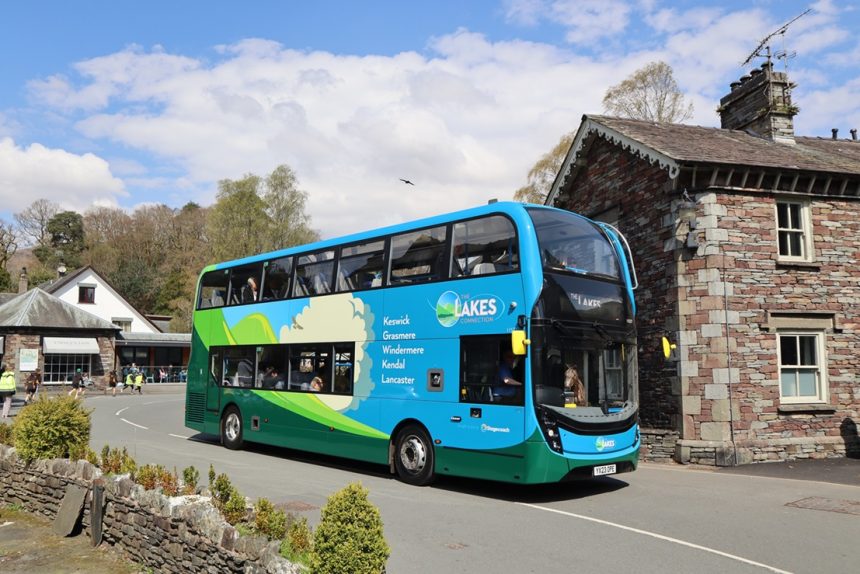The Transport Committee has called on the government to reform how bus services are funded amid a series of recommendations made in response to its “Buses connecting communities” inquiry.
Its report following three sessions of evidence between March and May says five-year funding settlements would help reverse what it says has been a “decade of decline” in bus use and service connectivity.
It calls for ringfenced funding to protect socially necessary routes and says Bus Service Improvement Plan (BSIP) grants should be weighted towards rural areas.
Although the Transport Committee notes franchising is not a “silver bullet” for all areas of the country, it wants to see the Bus Centre of Excellence expanded to help local authorities which choose that route.
While highlighting the positive outcome of the bus fare scheme in England, more targeted measures such as free travel for under-22s should be considered, it adds.
England’s patchwork of local youth concessions requires a coherent national approach
Transport Committee Chair Ruth Cadbury MP says: “Buses are fundamental to many people’s quality of life. “Without them, residents on low incomes, older and younger people face social exclusion or being cut off from employment and services like hospitals or education. In many areas that is tragically already the case.
“The Department for Transport (DfT) should change the way funding is provided to ensure councils and bus firms would be committed to running socially necessary services, and, on that basis, should also adopt an ambition for all councils to develop and maintain a minimum level of public transport connectivity.
“To achieve this, the sector will need greater financial certainty, which is why we say the government should announce funding in five-year blocks.
“Those most affected by unreliable or even non-existent buses include the young, who need them to get to school, college, university and their first jobs. Denying young people these experiences denies them their life chances. We call for a universal, free bus pass for all under-22s to equalise opportunity.
“While the bus fare caps have been beneficial, the government has yet to spell out a coherent strategy of what they aim to achieve, and whether more targeted options could produce better outcomes.
“Franchising works for London and Manchester but is unlikely to be a silver bullet for the rest of the country. Many local councils’ workforces now lack the skills and capacity to suddenly start overseeing bus services. We therefore say that the Bus Centre of Excellence should be expanded to provide more targeted support and training.
“While the government’s Bus Services Bill contains positive ideas, the Transport Committee’s report says ministers should go further to get bums back on seats.”
Long-term funding and reform
The report welcomes the announcement in the Spending Review in June which gave three-year funding certainty for bus operators. However, it recommends five-year settlements for both capital and revenue funding.
While the Bus Services Bill is designed to protect socially necessary services, the committee says that ringfencing a portion of the funding it gives locally would ensure local authorities are able to ensure communities are not cut off.
The committee welcomes the switch away from a competitive bidding approach and use of a needs-based formula linked to population, mileage and deprivation in its latest round of BSIP allocations.
But the report says: “The Department should consider introducing a rural weighting into its revised Bus Service Improvement Plan funding formula to reflect the higher per-passenger costs and structural challenges of serving low-density areas. This would help ensure that network improvement ambitions are not undermined by geographic disadvantage.”
It adds that Bus Services Operators Grant funding appears to disadvantage low-demand and rural areas. Calling for reform of that funding mechanism, it says: “The overarching goal of reform should be to incentivise growth in ridership, particularly across under-served areas, for example instead of mileage the grant could be based on passenger journeys.”
Fare cap questioned and free travel for the young
Although pointing out that the fare cap had helped raise patronage by as much as 10.1% in some rural areas, it concludes the scheme lacks strategy and is short-term in nature.
“DfT should develop, in partnership with local transport authorities and within 12 months, clear strategic priorities for what bus fares are aiming to achieve,” the committee says. “It should articulate the strategic purpose of fare structures and guide consistent, transparent fare-setting at a local level.”

With young people often hindered in reaching college or work, the committee argues for fare schemes targeted instead at them. Under-22s in Scotland can already use buses for free, while Wales will begin a pilot that will allow that age group to buy a single fare for £1 or all-day ticket for £3.
The government, when quizzed on a nationwide scheme, has pointed out that many local authorities use government funding to set up their own similar schemes. However, the committee says: “England’s patchwork of local youth concessions requires a coherent national approach to ensure fair access and to drive economic growth and equal opportunity.”
The move to franchising
The report says franchising can improve bus services but adds: “Many local authorities currently lack the legal, commercial, and operational capacity to take on the risks and challenges of franchising bus services.” Support from an expanded Bus Centre of Excellence is advocated in the report.
A lack of early access to patronage data could hold back some authorities in their transition towards bus franchising and this needs to be addressed, says the committee.
Also promoted is requiring local transport authorities who take up bus franchising to incorporate improved employment standards for bus workers, including minimum pay rates.
Demand-responsive transport is pushed in the report as being a useful tool in some circumstances, but it adds: “Their potential is being undermined, however, by fragmented regulation, inconsistent funding streams, and a lack of integration in mainstream transport policy and local planning.”
The government should set out a “vision” of what a successful bus network should look like and complement that with a metric that enables meaningful comparison of services across different parts of the country.
The document also says the government should impose a minimum standard on bus stop facilities, including provision of real-time information. It also calls for guidance on how local authorities and transport providers can improve integration between bus timetables and those of other transport modes.
CPT response
Confederation of Passenger Transport (CPT) believes the tone of the report’s introduction to be overly “gloomy”. Among the statistics used in the report is that, the number of bus journeys dropped from 4.6 billion in 2009 to 3.6 billion in 2024, according to DfT.
However, Graham Vidler, CPT Chief Executive of the Confederation of Passenger Transport, says: “Bus operators welcome the Transport Committee’s ambition of getting more bums on seats, and MPs’ call for a new national bus strategy. But perceptions of a ‘decade of decline’ in bus travel are outdated and far too gloomy.
“The number of bus journeys taken across Britain rose by 8% last year, including a 10% increase in bus travel across England outside London – the biggest rise for decades. The COVID-19 pandemic and local authority austerity harmed the bus network. But bus travel is staging a comeback, supported by the national fare cap and investment by bus companies in modern, environmentally friendly vehicles.”
Perceptions of a ‘decade of decline’ in bus travel are outdated and far too gloomy
On fares, CPT stops short of calling for universal free travel for under-22s but promotes a £1 fare cap for the young which it says would cost the public purse £100-150 million per year in England.
It adds: “Bus operators would welcome minimum bus service levels nationwide – although this can only be delivered through sustained, long-term funding for the industry and would need to be backed by hard cash from the Treasury. To make it work, the Government needs to provide five-year visibility on funding and should act to ensure transport spending is ringfenced for buses.
“To truly boost bus usage across the country, politicians need to commit to speeding up buses. That means round-the-clock bus lanes, traffic light priority and better co-ordination of roadworks to take buses out of traffic and get passengers to their destinations quickly. Faster journeys would create a virtuous circle of more passengers on board, more investment by bus companies, greater frequencies and less car traffic on the road.
“Every pound invested in local buses brings £4.55 of benefits for communities, the environment and the health of the nation. An investment in buses is an investment in the wellbeing of future generations.”


























